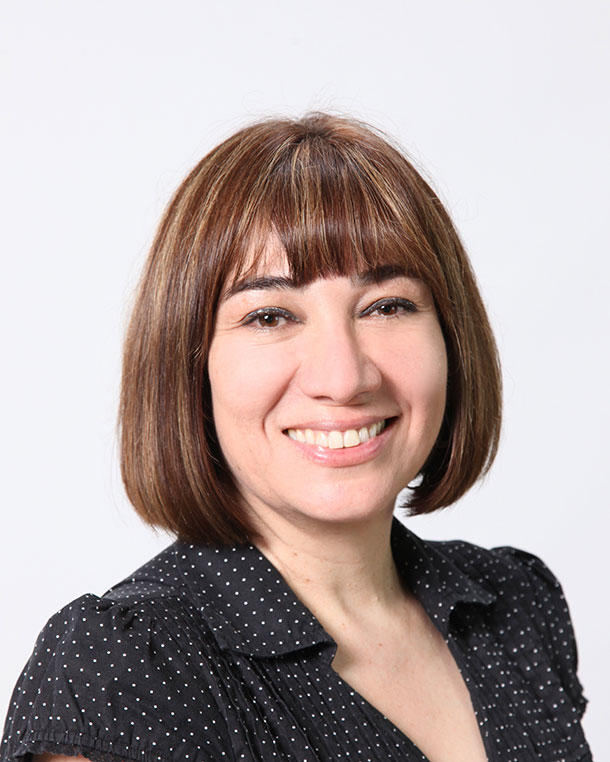Constanza Camargo Awarded Scientific Tenure by the NIH
, by Jennifer K. Loukissas, M.P.P.
In December 2024, Constanza Camargo, Ph.D., M.S., M.H.A., was awarded scientific tenure by the NIH and promoted to senior investigator in the Metabolic Epidemiology Branch. Dr. Camargo is an internationally recognized expert on the epidemiology of gastric cancer, an understudied malignancy with high mortality and substantial economic and social costs. As a demonstrated leader within the scientific community, she convenes experts from around the world to collaborate on projects to advance the research agenda.
Earlier this year, she co-led the planning of the Think Tank on Advancing Gastric Cancer Prevention, a forum for an international multidisciplinary group of gastric cancer experts to review the state of the science and collaboratively identify critical knowledge gaps. Over 200 extramural and intramural clinicians, researchers, and patient advocates attended the all-day event. The NIH and NCI Directors acknowledged the opportunity to accelerate progress on the gastric cancer agenda by working together across disciplines and by engaging multiple stakeholders.
Dr. Camargo employs descriptive epidemiology and etiologic and translational approaches in her comprehensive research program. The burden of gastric cancer falls primarily on economically and socially marginalized communities in the U.S. and thus presents a substantial health disparity. She brought to light a major change in incidence patterns of gastric cancer among younger birth cohorts in the U.S.; following decades of decreasing rates across all age groups in the U.S., she observed an increase in noncardia gastric cancer among young non-Hispanic White and Hispanic White individuals, particularly women.
Dr. Camargo continues to track this evolving problem to determine if it extends to all ethnic groups in the U.S. She showed some similar trends in higher income countries in Latin American. Her primary hypothesis to explain the changes is the effect of autoimmune disease (i.e., autoimmune gastritis), which have increased in high income countries and are typically more common in women.
Her etiologic work spans both infectious and genetic factors, from studies of Helicobacter pylori (H. pylori)—the primary cause of gastric cancer—and Epstein Barr viral infection, to genome-wide associations studies (GWAS) of common inherited factors that may influence risk. The Gastric Cancer Precursor Lesions Study (GCPL), a multidisciplinary project in Chile, bridges her focus on etiology and translational research. She and her colleagues are evaluating known, understudied, and novel risk factors as well as potential noninvasive screening markers that may inform risk stratification. Better understanding of gastric cancer etiology may inform future efforts for prevention and control.
In addition to the GCPL, she has envisioned and co-leads a second major programmatic resource, the H. pylori Genome Project (HpGP), an international collaboration that has assembled and annotated molecular variation within whole bacterial genomes from around the world for future mechanistic investigation. H. pylori infects about half the world’s population, yet cancer arises in only a small fraction of infected individuals and bacterial genetic variation may play a key role in disease risk.
Dr. Camargo is leading a GWAS in Hispanic/Latino individuals from 27 collaborating centers in North, Central, and South America to create a multi-ethnic polygenic risk score (PRS) for gastric cancer and to define the underlying architecture of genetic susceptibility. In the future, she plans to conduct a GWAS of intestinal metaplasia to determine the extent to which gastric preneoplasia and gastric cancer share common genetic susceptibility factors, further refining the utility of the PRS for gastric cancer prevention.
Her commitment to training the next generation of scientists is a foundational tenet of her career. She has served as a primary and secondary mentor to a diverse set of fellows from different backgrounds. Her excellence in mentoring was recognized with the DCEG Women Scientist Advisors’ Mentoring and Leadership Award.
Dr. Camargo serves on the editorial boards of numerous journals and leads several important committees. She co-chairs the DCEG Cancer Health Disparities Working Group and the NIH Hispanic Health Research Scientific Interest Group. Additionally, she has served on the Promoting Equity and Inclusion in the NCI Community Working Group, the Advisory Committee of the Health Disparities Interest Group at the National Institute on Minority Health and Health Disparities and is an ex-officio member of the 2022 Clinical Trials and Translational Research Advisory Committee Gastric and Esophageal Cancers Working Group. She is an advisor to the Cancer Intervention and Surveillance Modeling Network Gastric Working Group, and a member of the American Association for Cancer Research Cancer Prevention Working Group Steering Committee.
